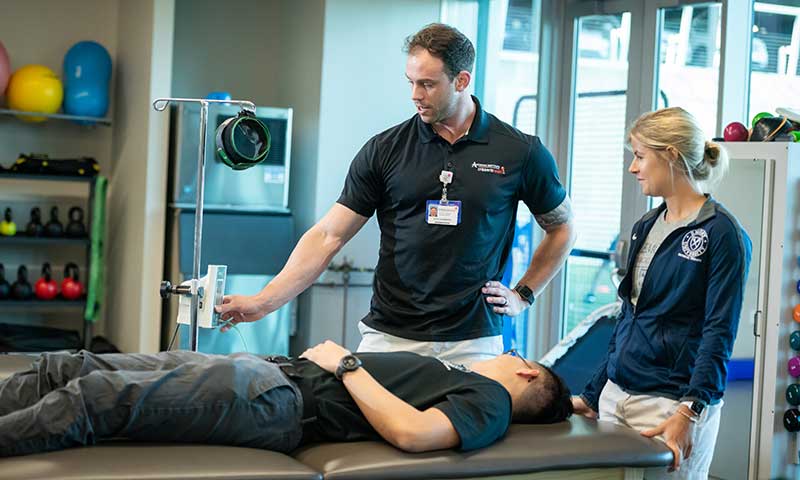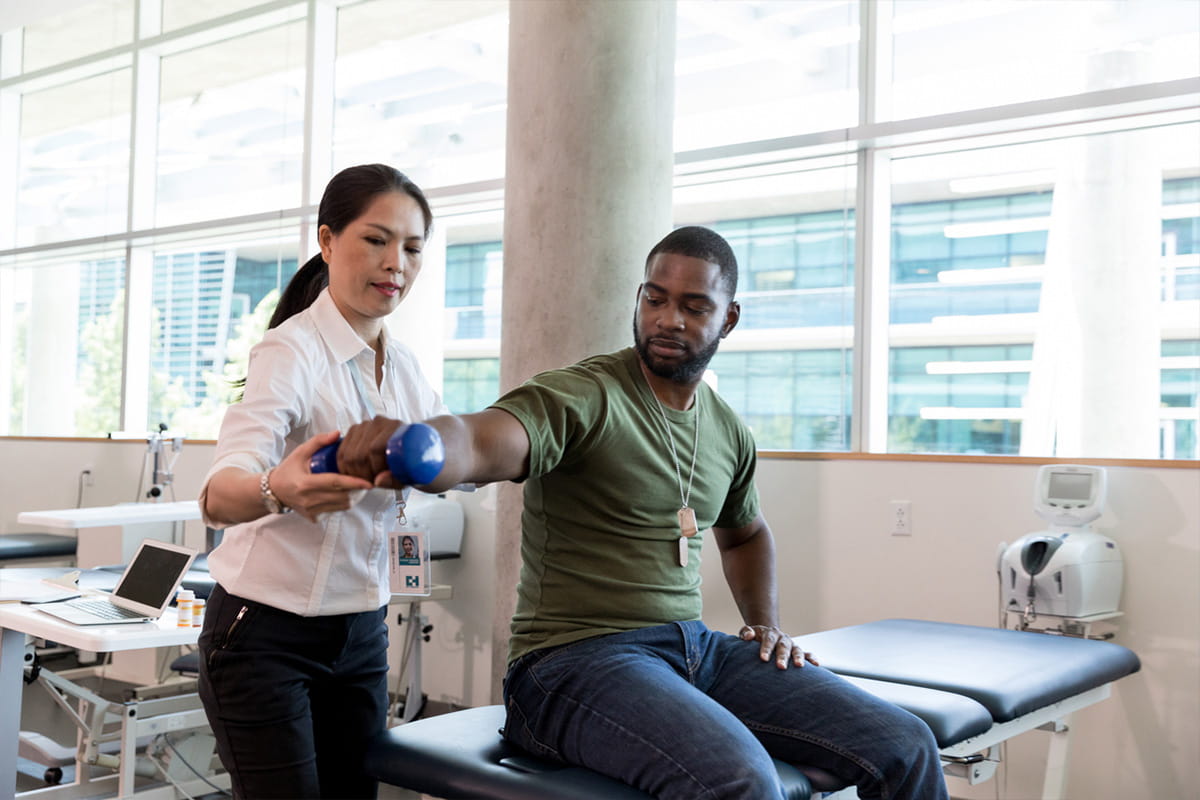Recovery Redefined: Your Resource for Orthopedics and Physical Therapy Roanoke
Wiki Article
Understanding the Role of Physiotherapists in Sports Medication
Recognizing the duty of physical therapists in sports medication is critical for professional athletes and medical care professionals alike. Physical specialists play a vital function in examining professional athletes' conditions and injuries, creating personalized treatment strategies, and executing rehab techniques. Teaming up with medical care experts and trainers, physical therapists give extensive treatment to athletes, ensuring their general health and optimum performance.
Assessing Athlete's Injuries and Conditions
Physical therapists in sports medicine play an important function in assessing professional athletes' conditions and injuries. The ability to precisely evaluate a professional athlete's injury is vital in identifying the suitable course of treatment and rehabilitation.Throughout the evaluation, physiotherapists collect vital info such as the professional athlete's case history, previous injuries, and present symptoms. They also do a thorough physical exam, examining factors such as series of movement, adaptability, stability, and strength (physical therapists Roanoke). Special analysis tests and imaging might also be used to additional assess the injury or condition
By conducting this comprehensive analysis, physical therapists are able to properly detect the injury and develop an individualized therapy strategy. This may include therapeutic workouts, manual therapy techniques, and modalities such as heat or cold treatment. Furthermore, physical therapists supply education and support on proper techniques for preventing future injuries, as well as approaches for optimizing efficiency and minimizing the danger of re-injury.
Creating Customized Therapy Plans
Physiotherapists in sporting activities medicine establish tailored therapy strategies based on their comprehensive examination of an athlete's injuries and conditions. This process entails a thorough understanding of the athlete's case history, checkup, and analysis tests. By collecting this details, the physical therapist can identify the underlying reasons for the injury or condition and establish one of the most ideal training course of treatment.The customized treatment strategy intends to deal with the specific demands of the professional athlete and promote optimal healing. It might include a mix of healing workouts, hand-operated therapy techniques, techniques such as heat or chilly therapy, and education on injury prevention. The physiotherapist will also consider the athlete's goals, sport-specific demands, and timeline for go back to play when creating the therapy plan.
Furthermore, the therapy plan may evolve gradually as the athlete advances in their rehab. Routine re-evaluations allow the physiotherapist to assess the effectiveness of the treatments and make any required alterations. The supreme goal is to promote the athlete's secure go back to their sporting activity while minimizing the threat of re-injury.
Carrying Out Rehab Strategies
The implementation of rehab techniques plays a critical role in the treatment procedure for athletes in sports medicine. These strategies are made to help athletes recoup from injuries, boost their efficiency, and prevent more injury. Physiotherapists, as experts in activity and feature, are in charge of applying these strategies and directing professional athletes via their rehabilitation trip.One of the key aspects of implementing recovery methods is the assessment of the athlete's condition. Physical specialists assess the professional athlete's injury or condition, considering elements such as the seriousness of the injury, the professional athlete's goals, and their present level of physical conditioning. Based upon this assessment, the specialist creates a personalized therapy strategy that includes certain rehab techniques.
Recovery strategies can include a variety of interventions such as healing workouts, hand-operated treatment, modalities (e.g., warm, cool, electric stimulation), and practical training. These strategies are customized to address the athlete's certain needs and goals, aiming to bring back optimum function, minimize pain, and improve efficiency.
Throughout the rehab process, physiotherapists very closely check the professional athlete's progression and make any type of needed modifications to the treatment strategy. They also offer education and guidance to the professional athlete on proper kind, injury avoidance methods, and self-care methods.
Enhancing Efficiency and Stopping Injuries
A crucial element of the physiotherapist's function in sporting activities medicine is boosting efficiency and preventing injuries through read more targeted treatments. Physical therapists play a crucial role in enhancing professional athletes' performance and decreasing the danger of injuries by using various approaches and techniques.To improve efficiency, physical specialists work carefully with athletes to establish tailored workout programs that concentrate on improving toughness, endurance, adaptability, and equilibrium. Roanoke physical therapy. These programs are designed to attend to certain locations of weak point or constraint, allowing athletes to reach their complete possibility. In addition, physiotherapists may employ methods such as hands-on treatment, including joint mobilization and soft tissue mobilization, to maximize athletes' movement patterns and enhance general performance

Collaborating With Healthcare Professionals and Coaches
Cooperation with medical care specialists and trains is vital for physical therapists in optimizing athlete efficiency find more and stopping injuries in the field of sports medication. Roanoke physical therapy. Physical therapists play a crucial duty in the multidisciplinary group that sustains athletes, and effective partnership with other professionals is vital for supplying detailed care
When functioning with health care experts, physiotherapists team up carefully with doctors, orthopedic specialists, and sporting activities medicine specialists. This collaboration allows for much better evaluation, medical diagnosis, and therapy planning for professional athletes. By sharing their know-how and understanding, physiotherapists can contribute valuable understandings and viewpoints to the group, making certain the very best feasible results for athletes.
Additionally, collaboration with coaches is important for physiotherapists to develop and execute reliable training and conditioning programs. Coaches supply valuable info concerning the specific needs and goals of the sporting activity, as well as the professional athlete's training routine and efficiency expectations. By interacting, physiotherapists and trains can create customized programs that attend to the professional athlete's individual needs and enhance their efficiency while reducing the risk of injury.
In addition, collaboration with health care specialists and trainers extends beyond the therapy and training phase. Physical therapists commonly function very closely with these experts in creating injury avoidance methods and protocols. By sharing their experience and knowledge, they can add to the development of evidence-based techniques that intend to minimize the incident of injuries and make best use of professional athlete efficiency.
Final Thought
Finally, physiotherapists play a vital role in sports medication by reviewing athletes' conditions and injuries, developing personalized therapy strategies, implementing rehab techniques, improving performance, and stopping injuries. They also work together with health care professionals and coaches to make sure detailed care for professional athletes. Their knowledge and understanding contribute substantially to the total wellness and wellness of athletes in the area of sporting activities medicine.Physical specialists play a crucial role in assessing athletes' conditions and injuries, developing individualized therapy plans, and carrying out rehabilitation strategies. Physical specialists evaluate the athlete's injury or condition, taking right into helpful resources account factors such as the intensity of the injury, the professional athlete's objectives, and their present degree of physical health and fitness.In terms of injury avoidance, physical specialists utilize their knowledge of biomechanics and activity evaluation to identify possible threat aspects that might incline athletes to injuries. Physical specialists enlighten professional athletes on proper warm-up and cool-down techniques, proper shoes, and injury prevention approaches, empowering them to take an energetic role in preventing injuries.
In final thought, physical specialists play a crucial duty in sports medicine by evaluating professional athletes' injuries and problems, establishing tailored therapy plans, executing recovery methods, improving performance, and stopping injuries.
Report this wiki page